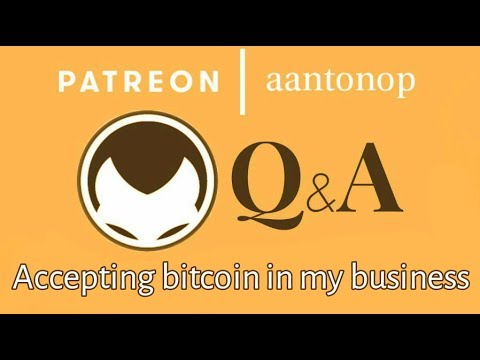What are the safest practices for accepting bitcoin at my business? Why is it important to maintain custody and use open-source solutions? Is it possible to accept donations via Lightning? What are invoiceless payments? How could an auditor explore records of Lightning network payments, such as for tax purposes? Capital gains reporting is difficult.
Buy awesome custom t-shirts with bitcoin! https://aantonop.com/shop/
These questions are from the September monthly patron session, the fifth session of MOOC 12, and the October monthly patron session, which took place on October 11th, and October 26th 2019, respectively. If you want early-access to talks and a chance to participate in the monthly live Q&As with Andreas, become a patron: https://www.patreon.com/aantonop
RELATED:
Measuring Success: Price or Principle – https://youtu.be/mPMsbgWl9p4
Beyond Price: Bitcoin’s Impact on the Future – https://youtu.be/rvwVbRQ5Ysc
Consensus Algorithms, Blockchain Technology, and Bitcoin – https://youtu.be/fw3WkySh_Ho
Advanced Bitcoin Scripting Part 1: Transactions and Multisig – https://youtu.be/8FeAXjkmDcQ
Advanced Bitcoin Scripting Part 2: SegWit, Consensus, and Trustware – https://youtu.be/pQbeBduVQ4I
What is Consensus: Rules without Rulers – https://youtu.be/2tqo7PX5Pyc
Forkology: A Study of Forks for Newbies – https://youtu.be/rpeceXY1QBM
Bitcoin: Where the Laws of Mathematics Prevail – https://youtu.be/HaJ1hvon0E0
Software distribution security – https://youtu.be/_V0vqy046YM
What is mining? – https://youtu.be/t4p4iMqmxbQ
The mining process – https://youtu.be/L4Xtau0YMJw
Nonces, mining, and quantum computing – https://youtu.be/d4xXJh677J0
Iterating nonces and the block reward – https://youtu.be/tjn2aoMaFlY
Miners, pools, and consensus – https://youtu.be/JHz7LM4ncLw
Mining, energy prices, and fee market – https://youtu.be/hrVCd6Pt4l4
What is difficulty targeting? – https://youtu.be/h429LCTRmQw
Genesis block and coinbase transactions – https://youtu.be/strhfzJ56QE
Cryptographic primitives – https://youtu.be/RIckQ6RBt5E
The rules of Bitcoin (part 1) – https://youtu.be/VnQu4uylfOs
The rules of Bitcoin (part 2) – https://youtu.be/vtIp0GP4w1E
Rules versus rulers – https://youtu.be/9EEluhC9SxE
The value of proof-of-work – https://youtu.be/ZDGliHwstM8
Could a state-sponsored 51% attack work? – https://youtu.be/KUd8ZGgm6Qo
Honest nodes and consensus – https://youtu.be/KAhY2ymI-tg
Spam transactions and Child Pays For Parent (CPFP) – https://youtu.be/t3c0E4fkSNs
Is Bitcoin a democracy? – https://youtu.be/TC3Hq76UT5g
Governments versus Proof-of-Work or Proof-of-Stake – https://youtu.be/qrwgYDAoZV0
Decentralized power, leaderless governance – https://youtu.be/E5VbDlQTPzU
What is the role of nodes? – https://youtu.be/fNk7nYxTOyQ
Why running a node is important – https://youtu.be/oX0Yrv-6jVs
Spam transactions and Child Pays For Parent (CPFP) – https://youtu.be/t3c0E4fkSNs
Energy consumption – https://youtu.be/2T0OUIW89II
Solar energy and mining in space – https://youtu.be/cusakcpa8AM
Bitmain and ASICBoost allegations – https://youtu.be/t6jJDD2Aj8k
Binance hack, chain rollback? – https://youtu.be/2cZhkV6BqLg
Block reward, reorg protection, and immutability – https://youtu.be/R6KMp6vkeVU
Medium of exchange, unit of account, and reserve currency – https://youtu.be/ExuHOCyje-w
Andreas M. Antonopoulos is a technologist and serial entrepreneur who has become one of the most well-known and respected figures in Bitcoin. He is the author of “Mastering Bitcoin,” “The Internet of Money” series, and “Mastering Ethereum.”
Follow on Twitter: @aantonop https://twitter.com/aantonop
Website: https://antonopoulos.com/
Subscribe to the channel to learn more about Bitcoin & open blockchains; click on the red bell to enable notifications about new videos!
MASTERING BITCOIN, 2nd Edition: https://amzn.to/2xcdsY9
Translations of MASTERING BITCOIN: https://bitcoinbook.info/translations-of-mastering-bitcoin/
THE INTERNET OF MONEY, v1: https://amzn.to/2ykmXFs
THE INTERNET OF MONEY, v2: https://amzn.to/2IIG5BJ
Translations of THE INTERNET OF MONEY:
Spanish, ‘Internet del Dinero’ (v1) – https://amzn.to/2yoaTTq
German, ‘Das Internet des Geldes’ (v1) – https://amzn.to/2LEiyqO
German, ‘Das Internet des Geldes’ (v2) – https://amzn.to/2VCzse5
French, ‘L’internet de l’argent’ (v1) – https://www.amazon.fr/Linternet-largent-Andreas-M-Antonopoulos/dp/2856083390
Russian, ‘Интернет денег’ (v1) – https://www.olbuss.ru/catalog/ekonomika-i-biznes/korporativnye-finansy-bankovskoe-delo/internet-deneg
Vietnamese, ‘Internet Của Tiền Tệ’ (v1) – https://alphabooks.vn/khi-tien-len-mang
MASTERING ETHEREUM: https://amzn.to/2xdxmlK
Music: “Unbounded” by Orfan (https://twitter.com/grassfedbitcoin)
Outro Graphics: Phneep (http://www.phneep.com/)
Outro Art: Rock Barcellos (http://www.rockincomics.com.br/)
source
















TBC is spendable today, and it holds value! Speed of Growth is increasing within every measurement, including how many REAL MERCHANTS are joining everyday now. Expect the Speed of Growth to continue to increase dramatically! Soon TBC Merchants will be handy and close to all of us all around the world. TBC is REAL! Be proud of YOUR Super Power to turn people into TBC Millionaires.
Are there BTC burner wallets?
Or..
Could BTC be nested as meta-data in a crypto transaction?
Stashed in a wrapped-crypto-kitty maybe.
I can see some sort of “suspended in transit”
way of safekeeping,
Also a similar way to go to paper transfer.
(via nft)
Andreas the video is without subtitles in other languages.
Dear Andreas, LN just sounds so complicated and not user friendly. I would prefer a onchain solution
My business accepts BTC since 2014 (yep, I am glad today that I tried it "just for fun" at that time 😉 Starting "all manually" in the beginning for just one customer. Today we always have like 10000 vanity addresses created in advance. So an ordinary malware at the customers PC cannot easily replace those addresses.
how maby bitcoin addresses can be created, is there a limit?
can we run out of addresses?
Por favor me ajude com bitcoins.
Carteira:
3PMuELoRLEgfJMDKt8GBDCfzzzHJ77XRVu
BTC is a failure as a payment system
Thank you.
In practice wouldn’t it be safer to reuse an address for a frequent customer making large transactions so there is never any possibility of confusion as to what address to use? Ie: client sends payment using their uncompromised system and you confirm receipt of it. A few weeks later their system is compromised with malware that replaces BTC addresses in their web browser with a hacker’s BTC address, your invoice’s BTC address is now the hacker’s BTC address.
Wallet makers should implement some sort of GUI security mechanism for checking that 2 addresses go to the same wallet without having to give your entire extended public key to a customer. I guess you could use signatures in some way? Send the address and a signature with a reoccurring secret message that only the client knows?
Business should accept coins like Monero. And nobody will know your truth wealth. Because if you know wealth you can confiscate using KYC and etc.
When cheap electricity arrives with fusion energy, how would this affect the price of Bitcoin?
One of the best things about these is that there is absolutely no fluff/ intro at all straight to the questions
Fairly long Q & A on a fantastic topic. Love it!
Anytime I think I'm well versed in Bitcoin, I just tune into Andreas to have my bubble burst
Master, ?
Best channel and best content to educate and create awareness of blockchain technology. I'm always telling people and my viewers about this channel.
FIRST